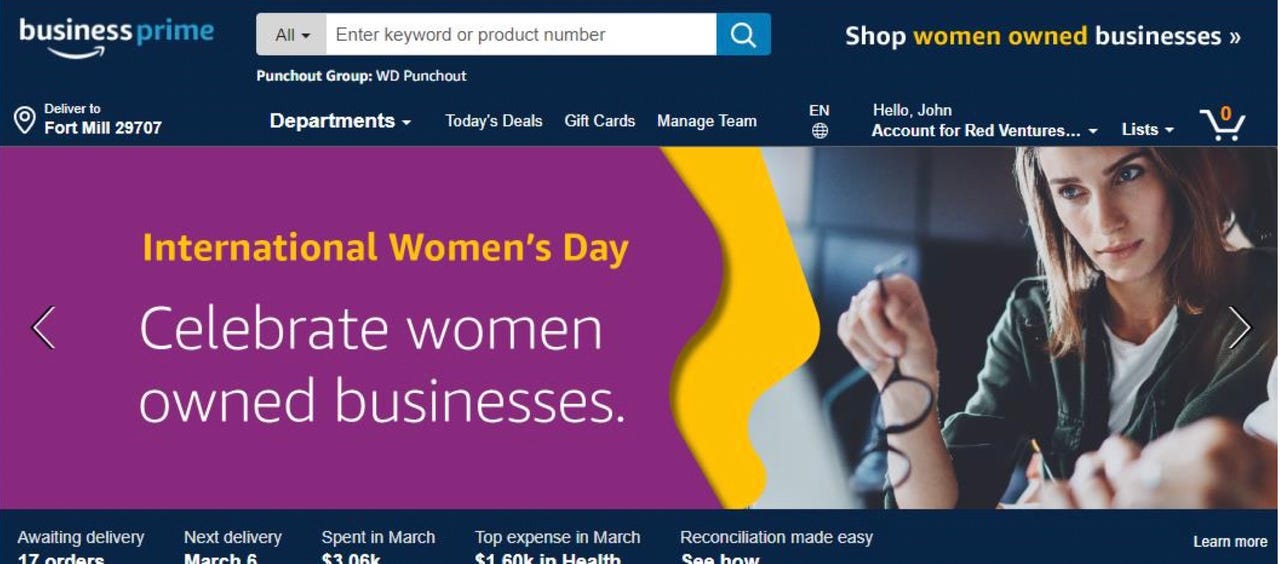'ZDNET Recommends': What exactly does it mean?
ZDNET's recommendations are based on many hours of testing, research, and comparison shopping. We gather data from the best available sources, including vendor and retailer listings as well as other relevant and independent reviews sites. And we pore over customer reviews to find out what matters to real people who already own and use the products and services we’re assessing.
When you click through from our site to a retailer and buy a product or service, we may earn affiliate commissions. This helps support our work, but does not affect what we cover or how, and it does not affect the price you pay. Neither ZDNET nor the author are compensated for these independent reviews. Indeed, we follow strict guidelines that ensure our editorial content is never influenced by advertisers.
ZDNET's editorial team writes on behalf of you, our reader. Our goal is to deliver the most accurate information and the most knowledgeable advice possible in order to help you make smarter buying decisions on tech gear and a wide array of products and services. Our editors thoroughly review and fact-check every article to ensure that our content meets the highest standards. If we have made an error or published misleading information, we will correct or clarify the article. If you see inaccuracies in our content, please report the mistake via this form.
What is Amazon Business and how do I use it?


As Amazon has become synonymous with online shopping and fast delivery, we should talk about the company's offshoot business branch Amazon Business. Including multi-user accounts, and quantity discounts for larger orders, the platform aims to serve entrepreneurs, organizations, and startups.
On its website the company claims "Amazon Business combines the selection, convenience, and value you expect from Amazon, with features that can help improve your operations." But what does that really mean, and is it worth investing in an account?
Read on for our breakdown of Amazon Business' -- and Business Prime's -- unique features, how you can leverage them, and if its benefits outweigh the cost.
Also: How to turn your old devices into Amazon gift cards
How Amazon Business works: An overview
As the name suggests, Amazon Business works best for businesses and serves customers in the US, Canada, Japan, India, Germany, Spain, United Kingdom, France, and Italy.
Amazon Business is best for businesses that want direct access to bulk items, restricted sellers, controls and monitoring of spending across multi-users, and spending analytics to follow.
Also: Amazon Prime vs. Amazon Business Prime: Everything you need to know
What's the difference between traditional Amazon and the Business platform?
At this point you may be asking yourself, these features sound great, but how exactly do I use them and are they really that different from regular Amazon or Prime?
Long answer short: the differences aren't drastic, but shift from a search-and-find atmosphere on the front end to an analytical, administrative focus on the back end. Of course, finding products is still made easy, but the Business tools foster a more efficient supply-flow for a larger consumer volume.
Amazon Business and its premium Business Prime strive to be a one-stop shop that tailors Amazon's reliable features to supply businesses.
You can even watch a livestream via Amazon Business.
Amazon Business key features' benefits...and costs
Read below for how exactly the administrative, supply-management features can benefit businesses, but beware their costs.
1. Greater access and business-only offers
Not wildly different from how the regular storefront works, Amazon Business works to give customers access to thousands of sellers, often at discounted prices.
Amazon Business, however, works with sellers who often restrict orders, or don't sell their products on regular Amazon at all, to provide for Amazon Business certified customers.
For example, Amazon Business sellers can restrict healthcare, industrial, or lab essentials on the regular platform so that the products are a "business-only offer."
2. Business Pricing
When it comes to pricing, Amazon Business customers also get exclusive discounts as well as an opportunity to sustain savings through some of the following:
- Deals: As with any deal on Amazon or Amazon Prime, the Business platforms offer daily deals on select items. Like regular Prime, Business Prime also offers exclusive Prime prices.
- Progressive discounts: A rewards-program concept, Amazon Business offers progressive discounts on products, determined by the company's order-volume over the past calendar year. Beware that these deals are restricted to certain items of certain quantities.
- Repeat deliveries: You can get a 5% discount on any usual monthly deliveries.
- Negotiation still works: Like with many traditional business supply partnerships, Amazon Business also allows for negotiation. If you have a pre-existing relationship, or fall into a particular customer niche (licensed hairdresser, for example), you can work with the seller directly to negotiate a price not listed on the Business storefront.
3. Business Prime benefits and signing up
Creating an Amazon Business account may be free, but don't let that fool you. To leverage on major shipping deals, premium analytical tools, and multi-member platforms, you'll need to opt for a Business Prime membership.
Here are some of Business Prime's unique analytical features:
- Multi-user accounts: So that one person doesn't take sole responsibility for multi-team orders, multiple people can have access to ordering and analytics. One of the biggest perks of the Business Prime platform, multiple users, and user roles, eliminates guess-work and chaos that can come with big and frequent orders.
- Spend Visibility: Thanks to AWS' cloud-based system, Amazon Business accumulates and presents data for you using KPI tools and data filters.
- Guided Buying: This tool guides multi-users exactly to what you want them to buy. To set it up, choose a policy type, product seller, and maybe add a note for buyers.
- WorkDocs: Basically the Amazon-powered version of GoogleDocs, WorkDocs is a secure space for collaboration and communication.
Note these three things about pricing before signing up:
- If you sign up using the same credentials you already have linked with an Amazon Prime account, Business Prime starts at $69 per year.
- If you sign up for Business Prime Essentials for $179 a year, you get access to Business Prime Essentials, which includes adding up to three members, free shipping, Guided Buying, Spend Visibility, and WorkDocs.
- You do get a free 30-day trial for Business Prime.
4. Multi-user access with Business Prime comes with a cost
With an analytical and administrative focus, the multi-user platform is perhaps the biggest benefit of Business Prime.
As I mentioned, you can even grant users different roles from administrators to buyers, and even finance users.
But taking advantage of this tool can be pricey. Here are a few things to note:
- After the initial 30-day trial, a Business Prime membership starts at $139 per year, and requires additional fees for each member you add.
- Starting at $69 to add just one member, and going up to $10,099 for unlimited membership, you may have to ask yourself if the extra costs are worth any possible savings or the convenience.
Why would you take advantage? Here are a few key reasons.
- Remote or hybrid workers can order work from home supplies
- Office managers can set up recurring orders
- Multi-brand/ team organizations have control over what supplies they need
5. Approval workflow helps foster responsible spending
Giving multiple users access can be both productive and chaotic. Amazon Business allows users to manage organization purchases by:
- establishing purchasing guidelines.
- creating groups that have different purchasing permissions.
- setting delivery schedules.
- approval only if someone goes above a set threshold.
6. Insight from analytics
After spending, especially if it's inventory or business oriented, you most likely will revisit whether to reorder or rethink where your money goes.
The Business analytics tools grant insight to spending visibility beyond the individual, pre-built or custom spend reports, and access to multiple reports. And while viewing your payment and order history is nothing new from Amazon's regular platform, Amazon Business makes those records easy to compare for multiple or individual people via reconciliation reports.
7. Various payment options
Filing an expense report can be an entirely different administrative headache, especially when multiple groups and people have purchasing power. Amazon Business skips the middle man and offers the following:
- Buy now, pay later
- flexibility with pay by invoice with up to 30-day payment terms
- Possible rewards opportunities with the Business American Express Card
When I went to check out my work from home supplies, RedVentures' already set up the "pay by invoice" option.
8. Tax exemption
Now for what you've probably been waiting for, how does tax exemption work with Amazon Business? It's simple. If your organization is eligible for tax-exempt purchasing, enroll in the Amazon Tax Exemption Program for your purchases to be tax-exempt on Amazon Business.
9. Consolidated deliveries
Since Amazon Business is designed for customers to order in bulk, if your order qualifies as a large delivery that needs to be consolidated, it'll be delivered on a pallet to either a receiving dock or even to your doorstep.
Also: Amazon's friendly robot helper Astro will now double as a security guard for your business
How to join Amazon Business and customize settings
If you're convinced that Amazon Business is a productive tool worth the investment, here's how to get set up.
1. Visit the Amazon Business webpage
To get started, head to the Amazon Business Website.
2. Enter the email address you want to use for the account
Once you're on the landing page, you'll be prompted to enter an email address. Make sure that it's an email provided by your employer, or one that you can use for the Business platform. You'll also need to enter your name and create a password.
Note: If you try to join Amazon Business with an email that's already connected to a regular Amazon account, you'll be asked to upgrade that account to an Amazon Business account. If you decline this offer, you'll need to sign up with a different email.
3. Verify your business
At this point, Amazon will ask for your business information to help verify it, such as the address shown on your official documents.
Tip to get verified quicker: Provide your credit card or tax information such as a business or tax ID.
4. Wait for Amazon to verify your business
Within 24 hours of registering, Amazon will verify your business. From there, you should be good to go.
5. Manage account settings
Once you're signed into your business account, select "Account settings" from the dropdown menu. From here, you'll see an extra "business settings" option where you can set up your preferences for many of the key features discussed above.
If you want a detailed report on shipping, product, and seller information, make sure to click the "Orders" menu option directly OR select "Business analytics."
6. Manage multiple in groups
On your Amazon Business Prime interface, go to the "people" page to manage how many people have access, and to what extent they have control.
- First, go to "Business Settings" and select "People"
- Use the Actions dropdown menu to change a user's role, move a user to a different group, or create a custom policy or a user (have to get approval before purchasing, for example).
- To add a user, select "People" and then "Members."
- Select the person's username (must already be registered), and then select "Add to another group."
- From there, you can assign the applicable roles in that group and then select "Add to group" to seal the deal. Of course, you can always repeat the process to make further edits.
7. Browse and shop
Once you get your settings squared away, you're free to browse and shop. As with Amazon's regular website, you can shop by seller credentials, meaning you can shop and support Black, women-owned, and local businesses directly through Amazon. After adding your products to your cart, the check-out process is indistinguishable from Amazon's typical process.
Make sure that the address is correct and payment information is set up in a way that's easiest for your business.
FAQs
Is Amazon Business free?
Signing up for Amazon Business is free, but Business Prime costs an annual fee and additional costs if you decide to add multiple users. Check Business Prime's price list to see how prices vary depending on how many users have access.
How do I join Amazon Business?
Head to the Amazon Business website, enter the email address you want to be linked to your business account -- usually use your work address. Within 24 hours, Amazon will notify you that your account has been verified
What is Amazon Business service?
Amazon Business is like the traditional online marketplace, but tailored for businesses -- small and large. The suite also offers multi-member access, budget tools, and business specific products and prices.
What is an Amazon Storefront?
Different than Amazon Business or Business Prime, an Amazon Storefront is part of Amazon's influencer program that allows for people to link their products for others to shop as a part of their own Amazon interface. Read here for how you can start one.
